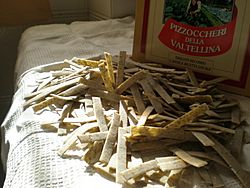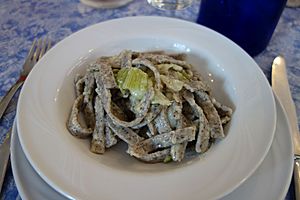Pizzoccheri facts for kids
 |
|
| Type | Pasta |
|---|---|
| Place of origin | Italy, Switzerland |
| Region or state | Valtellina, Graubünden |
| Main ingredients | Buckwheat, Wheat flour, Water |
Pizzoccheri are a special kind of pasta from Italy and Switzerland. They look like short, flat ribbons, similar to tagliatelle. What makes them unique is that they are mostly made from buckwheat flour (80%) mixed with a little bit of wheat flour (20%). Buckwheat gives them a darker color and a distinct, earthy taste.
This delicious pasta dish is traditionally prepared in a beautiful valley called Valtellina in northern Italy, and also in the Graubünden region of Switzerland. When cooked the classic way, pizzoccheri are mixed with healthy greens like Swiss Chard or cabbage, and soft, cubed potatoes.
After cooking, this mix is layered with tasty cheeses such as Valtellina Casera and Grana Padano or Parmigiano Reggiano. Finally, it's topped with garlic that has been gently fried in butter, giving the dish a wonderful aroma and flavor.
Contents
The History of Pizzoccheri
Pizzoccheri is not a new dish! It was first written about way back in 1550. A writer named Ortensio Lando mentioned it in a book about foods you could eat in Italy. This shows that pizzoccheri has been a beloved part of Italian cooking for a very long time.
Making and Enjoying Pizzoccheri
You can make pizzoccheri at home by hand, which is a fun activity. You can also buy them already made in stores, which saves time. If you make them fresh at home, it's usually best to eat them on the same day to enjoy them at their freshest.
Pizzoccheri Festivals and Recognition
The town of Teglio in Italy loves pizzoccheri so much that they have two special festivals for it! These festivals are called sagre. One festival, La Sagra dei Pizzoccheri, happens in July. The other, called The Golden Pizzocchero, is celebrated in September.
To make sure the traditional way of preparing pizzoccheri is remembered and passed on, a group called the Accademia del Pizzocchero di Teglio was started in 2002. They help keep the classic recipes alive. In 2016, pizzoccheri received a special award from the European Union. It was given a "Protected Geographical Indication" (IGP) status. This means that only pizzoccheri made in a certain way and in specific areas can use this name, protecting its traditional quality.
Different Kinds of Pizzoccheri
While the most famous pizzoccheri are made with buckwheat, there's another type called Pizzoccheri bianchi. These are found near the town of Chiavenna. They are quite different because they are a form of gnocchetti (small dumplings). They are often made using white wheat flour and dry bread instead of buckwheat.
See also
 In Spanish: Pizzoccheri para niños
In Spanish: Pizzoccheri para niños


